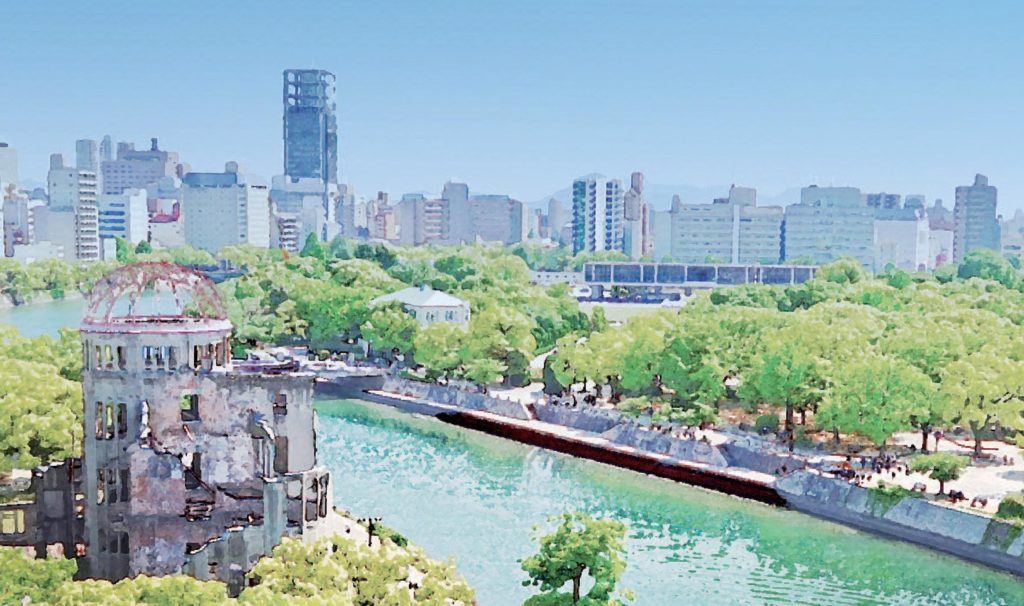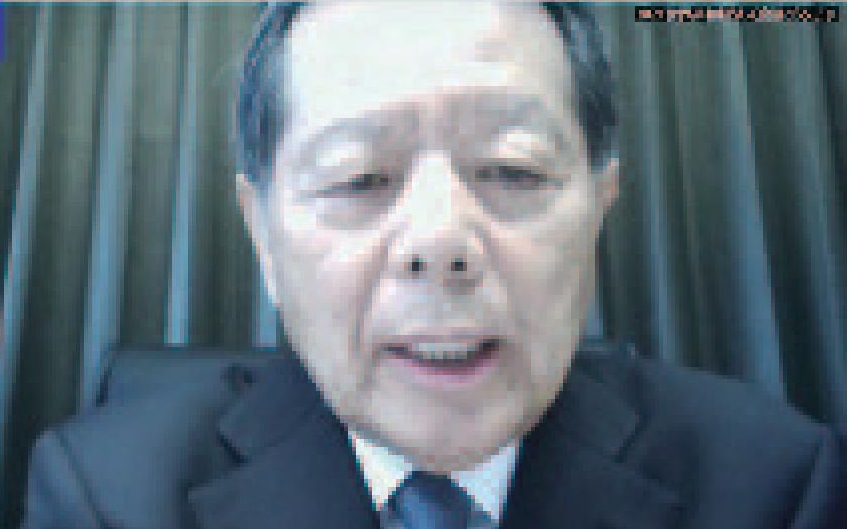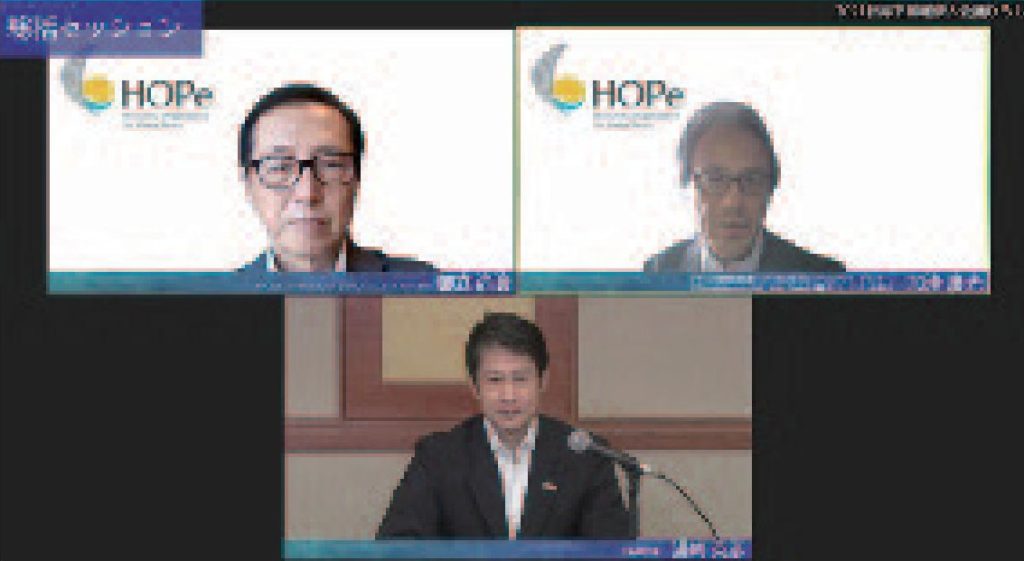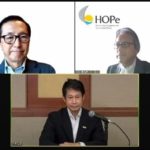2021Hiroshima Business Forum for Global Peace 【Achieve】
How we can revitalize the world and build an even better global community in2021
-Conquering the pandemic and overcoming discrimination, disparities and national favoritism-

Hiroshima Business Forum for Global Peace
The forum aims to contribute to the realization of a truly peaceful and sustainable global community by serving as a business platform where participants reaffirm and share with each other the importance of world peace, review the roles of entities such as businesses and NGOs, and multilaterally discuss the relationship between business and ways of promoting peace.
The World Business Conference for World Peace was initially in 2013 and it was renamed to the Hiroshima Business Forum for Global Peace in 2020(75 years since the atomic bombing ) to make a new start, and the 2021 forum was the 6th forum of its kind.
Date: Sept.8(Wed.)and Sept.9(Thu.)2021
Operating organization: Hiroshima Organization for Global Peace(HOPe)
【Keynote Speech】 FUNABASHI Yoichi Chairman, Asia Pacific Initiative
- Peace and the economy form a mutually complementary
 relationship. A virtuous circle of this kind is not functioning now. The economy will be like a weapon if globalization becomes extreme, and it may cause a decoupling of peace
relationship. A virtuous circle of this kind is not functioning now. The economy will be like a weapon if globalization becomes extreme, and it may cause a decoupling of peace
and the economy that will be damaging to peace. - What is necessary in modern times is a national security partnership in which people address not only military but also nonmilitary threats (climate change, pandemics, terrorism, cyber security issues, etc.) as their own issues.
- Businesspersons should take the initiative in working out emergency plans while also taking risks. They should speak up against populism and nationalism.
【Session 1】What businesses can do to combat climate change: Energy conversion
and innovative solutions toward creating a decarbonized society
- The degree of implementation of climate-action measures,
 one of the 17 SDGs, affects the attainment of other SDGs. Given the importance of the role of the private sector in addressing climate-change issues, it needs to step up and fund provisions and investments.
one of the 17 SDGs, affects the attainment of other SDGs. Given the importance of the role of the private sector in addressing climate-change issues, it needs to step up and fund provisions and investments. - Energy is fundamental to all kinds of economic activities. A carbon-free society thus cannot be achieved unless energy plans are combined with efforts to design investment schemes, improve overall social infrastructure efficiency and build an energy-conserving society. Under these circumstances, the central government and the private sector must join hands in building a viable business model.
- The biggest challenge is having a vision toward the goal during the transition period. Showing vision is an important role to be played by businesses. Our society depends on business behaviors.
| MITACHI Takashi (Moderator) | Senior Advisor, The Boston Consulting Group |
| KIDA Kazuya | President and Representative Director, Osaki CoolGen Corporation |
| TAKEUCHI Sumiko | Senior Fellow and Member of Board of Directors, International Environment and Economy Institute( IEEI)/Co-founder and President, U3Innovations LLC./Specially Appointed Professor, Tohoku University |
| HYODO Masayuki | Representative Director, President and Chief Executive Officer, Sumitomo Corporation |
| MIZUNO Hiromichi | Special Envoy of U.N. Secretary-General on Innovative Finance and Sustainable Investments |
【Session 2】Ensuring equitable access to essential medical supplies anytime, anywhere,
for anyone in the world
- Health risks can affect national security because they may
 lead to economic crises which eventually hurt a state’s independence and autonomy. The concept of flexible resilience is necessary for a country to deal with future crises.
lead to economic crises which eventually hurt a state’s independence and autonomy. The concept of flexible resilience is necessary for a country to deal with future crises. - Japan must work out globally oriented policy measures if it is to achieve global health. It is necessary to develop human resources who can play a role in the global community and form internationally-oriented communities.
- How should the economy and industries respond to significant changes in values? It is necessary to formulate policies that would produce desirable results from a medium- and long-term global perspective.
| KASHIWAKURA Mihoko (Moderator) | Head of East Asia Relations, Bill & Melinda Gates Foundation |
| KUROKAWA Kiyoshi | Professor Emeritus, the University of Tokyo and National Graduate Institute for Policy Studies, and Distinguished Professor of Tokai University |
| TAKEMI Keizo | Member of the House of Councillors/WHO Goodwill Ambassador for Universal Health Coverage( UHC) |
| NAKATANI Hiroki | Visiting Professor, Keio University School of Medicine/Chair and Representative-Director, GHIT Fund |
| YANAGAWA Noriyuki | Professor, Graduate School of Economics, University of Tokyo |
【Session 3】Business against the background of the U.S.-China Standoff
—How to cope with the geopolitical risk
- There is no future for companies seeking only profit.
 Priorities must be grasped, analyzed and defined in detail.
Priorities must be grasped, analyzed and defined in detail. - What is necessary is not a simple translation but a “communication-oriented translation” which adds interpretation. Japan can play a role in that area. It is not necessary to compromise where compromise is impossible. But it is necessary to compromise where compromise is possible.
- Even if values are different, it is possible to share interests. Japan should think about its national interests from a medium- to long-term perspective. Discussions on the matter are necessary.
| MURATA Koji (Moderator) | Professor of Political Science, Doshisha University |
| KAWAGUCHI Yoriko | Visiting Professor, Musashino University |
| TAKASHIMA Makoto | President and CEO, Sumitomo Mitsui Banking Corporation |
| MIURA Lully | President, Yamaneko Research Institute, Inc. |
【Session 4】Correcting the overheated laissez-faire doctrine: What businesses can do to
narrow the gap between the rich and the poor to maintain economic and
democratic stability
- The central government has a significant role to play to build
 a society in which people can change their jobs to those in new industries without worry. It is necessary to build a society in which recurrent education is assured for people seeking to study after entering the job market. It is also necessary to build a society in which employment fluidity and social safety nets are ensured.
a society in which people can change their jobs to those in new industries without worry. It is necessary to build a society in which recurrent education is assured for people seeking to study after entering the job market. It is also necessary to build a society in which employment fluidity and social safety nets are ensured. - An increase in the number of freelance workers can become an economic prime mover. It is ideal to build a society in which companies are motivated to promote “reskilling” (re-development and re-education of employees for the attainment of vocational skills) and for them to see the development of human resources, which are regarded as social assets, as benefiting their own interests.
- While complete fairness has yet to be achieved, a sound society is one in which people can develop their talents regardless of their family backgrounds. It is not too much to say that equality of opportunities and not resultant equality should be ensured.
- A sound society is one in which work force fluidity and generational changes are active while old things are constantly replaced with new things. It is necessary to review Japan’s labor system to promote the replacement of old things with new things.
| IDE Eisaku (Moderator) | Professor, Keio University Faculty of Economics |
| OTSUKI Nana | Expert Director, Chief Analyst, Monex, Inc |
| SHIBUSAWA Ken | CEO, Shibusawa and Company, Inc./Chairman, Commons Asset Management, Inc. |
| SUMI Shuzo | Senior Executive Advisor of Tokio Marine & Nichido Fire Insurance Co., Ltd. |
【Session 5】How we should handle dual-use technologies when the boundary
between peacetime and wartime is blurred
- Some restrictions are necessary on the use of personal
 information although such steps should not be a drag on innovation. There are things the Digital Agency can do about this.
information although such steps should not be a drag on innovation. There are things the Digital Agency can do about this. - Restrictive rules must be minimized because technological development may be hampered.
- It is necessary for Japan to establish a system in which experts with a variety of backgrounds can gather as a team and discuss economic and national-security impacts, for example, for decision-making.
- What is important is how dual-use technologies (military use and civilian use) are seen by their users. An ideal society is one in which suppliers are chosen for reasons other than economic rationality.
| JIMBO Ken (Moderator) | Professor, Keio University |
| SAKAMOTO Yukio | SVP of UniGroup/Former President and CEO of Elpida |
| HIRANO Miku | CEO, Cinnamon AI |
| MURAI Jun | Distinguished Professor, Keio University |
【Session 6】What businesspersons can do to promote diversity & inclusion
in the post-COVID-19 world
- Shifting to multistakeholder-based capitalism is necessary to
 ensure sustainability in future generations.
ensure sustainability in future generations.
Productivity must also be increased through diversity-led process innovation. - In view of the ongoing trend of diversity, companies will face a labor outflow unless they review the concept of “ordinary.” The business, social and sports communities must fulfill their responsibility of establishing a system in which disabled people can use their abilities to contribute to society.
- For all people to live comfortably, fairness is more important than equality. If there is no fairness, disparity-induced divisions between
| SUEMATSU Minako (Moderator) | Chairperson, Publisher and President, The Japan Times, Ltd. |
| OBINATA Kuniko | Director, Diversity & Inclusion Center, DENTSU PUBLIC RELATIONS INC. |
| KARASAWA Yasuyoshi | Chairman & Director, Chairman Executive Officer, MS&AD Insurance Group Holdings, Inc. |
| SUGIYAMA Fumino | Co-chair of Non-Profit Organization TOKYO RAINBOW PRIDE/Executive Board member of the Japanese Olympic Committee( JOC). |
【Session 7】Integration between business administration and peace by way of commons
- It is necessary to consider designing a social system in which
 the abstract idea of peace is managed as a real market through the utilization of finance and capital. It is time to shift from “ideas” to “practice” while using the commons (various shared resources and public goods).
the abstract idea of peace is managed as a real market through the utilization of finance and capital. It is time to shift from “ideas” to “practice” while using the commons (various shared resources and public goods). - Companies can develop themselves by providing jobs. They can avoid conflict with stakeholders by creating jobs for workers that keep their lives at a high level, protecting the environment and meeting their legal requirements.
- It is necessary to address poverty, labor, and environmental and peace issues from the perspective of advancing social marketing as part of the efforts to fulfill social responsibilities.
| YOSHIKAWA Narumi (Moderator) | Professor, Prefectural University of Hiroshima |
| EDO Cats | Head of Department/Professor, Prefectural University of Hiroshima |
| Ho Chi DZUNG | Head of Research and Development, PeopleOne Joint Stock Company |
| Marc HUMBERT | Emeritus professor of political economy, Rennes University/Co-founder of PEKEA, to build a Political and Ethical Knowledge on Economic Activities/Co-founder of the International Convivialist |
| YOKOYAMA Yoshinori | Dean, Prefectural University of Hiroshima |
【Concluding Panel Discussion】 Reflecting on this fiscal year’s forum (release of the 2021 Hiroshima Appeal)
| KAJI Yoshimitsu | Chairman and Chief Sustainable Development Officer, Cinnamon AI/Senior Principal, Hitachi Lumada Innovation Hub/Smart City Advisor, Kamakura City Government |
| MITACHI Takashi | Senior Advisor, The Boston Consulting Group |
| YUZAKI Hidehiko | Governor, Hiroshima Prefecture |
- The 2021 Hiroshima Appeal wrapped up discussions of this
 year’s forum and updated the 2020 Hiroshima Declaration issued last year.
year’s forum and updated the 2020 Hiroshima Declaration issued last year. - Ensuring peace, which is regarded as security for people in a broad sense, is a prerequisite for companies undertaking business activities. Peace is something that should be protected and strengthened by businesspersons. Work should be conducted to advance peace. Some of the work has produced the results intended in the SDGs.
- How to realize the proposals in the 2021 Hiroshima Appeal is a question to be addressed. There should be more work to ensure peace, achieve economic advancement and produce fruitful results.
- Utilitarianism is where an individual should seek his or her best interests by pursing the interests of other people. This is true utilitarianism, and businesses should work out long-term policies from this perspective.
2021 Hiroshima Appeal
2021 Hiroshima Business Forum for Global Peace
The predecessor of the Hiroshima Business Forum for Global Peace, the World Business Conference for World Peace in Hiroshima had been convened with the aim of creating a truly peaceful and sustainable global society through multifaceted discussions of ways to connect business with contributions to peace.
At the Forum that took place in August of 2020, which marked the 75th anniversary of the atomic bombing and the end of World War II, we held in-depth discussions on the roles that businesspeople should play to achieve “positive peace,” which involves eliminating peace-threatening issues, so that they can act accordingly.
The prolonged fight against COVID-19, however, is continuing to impact businesses and the socially disadvantaged, widening social disparity.
Worse, we have begun to see a conflict unfolding over some humanitarian issues, which call for global collective action. While economic security is important, if we use the economy as a weapon to the extreme, we might risk destroying the virtuous circle with peace, which the economy goes hand-in-hand with.
It is high time for us to create a system of international order from a long-term perspective that would promote the virtuous circle of peace and the economy, with the understanding that peace and the economy form a mutually complementary relationship. What we need now is to practice “true utilitarianism,” that is, for one to seek personal gain, one needs to simultaneously seek to benefit others, or multi-stakeholders.
Out of this desire and idea, we shall start “building back better” in 2021 to shape a future full of hope, with businesses making whatever contribution they can offer.
Our Specific Actions
By engaging in the SDGs and actively contributing to the creation of positive peace through business activities, we will achieve a deeper level of perpetual peace among humanity based upon both material and psychological fulfillment.
[From a perspective of global economy and disparity issues]
-We know that it is possible to compensate for capitalism’s potential weaknesses and contribute to achieving positive peace by incorporating the SDGs, such as reducing inequalities and bolstering global environmental protection, into business management, while leveraging its strengths. We have begun to see such initiatives here and there and hope to accelerate this trend. Specifically, with the recognition that poverty and disparity lead to social instability and erode business foundations, businesses should further expand activities that contribute to environmental protection, job security, and the reduction of disparities, while at the same time addressing social issues in their main business.
-To achieve sound economic growth and reduce disparity at the same time, businesses need to constantly recreate themselves. It is thus their responsibility to support training of their people of various generations, provide them with reskilling opportunities, and keep creating new jobs over the long-term perspective. At the same time, in order to create a virtuous circle, businesses and governments must work closely together through frequent dialogue.
-In the financial capital market, there have been moves toward quantifying the social impact of businesses, and a variety of investors have begun acting accordingly. Through collaboration between the financial capital sector and businesses, we seek to achieve the prosperity of all multi-stakeholders who are not overly shortsighted and have built their own systems.
-That diversity is maintained is a prerequisite for enhancing sustainability, innovation, and resilience of businesses and society. We will thus strive to build a social system that treats diversity as a given.
-For this to happen, we will create more opportunities to recognize, become aware of, and learn about unconscious biases that lay within (e.g., equality taking precedence over impartiality, obsession over precedents, etc.).
Meanwhile, businesspeople need to commit themselves to develop environments that are inclusive of diversity.
[From a perspective of contributions by businesses when geopolitical risks are in play]
-We must face the fact that geopolitical risks—the U.S.-China standoff being the prominent example—can affect the economy. On the other hand, we should not focus solely on conflicts as there are many topics that we all can share and empathize with, such as economy, culture, and climate change. Businesses and businesspeople in thirdparty countries, including Japan, can help reduce geopolitical risks by focusing on interdependent and cooperative relationships and by playing the role of interpreter between opposing parties.
-In pursuing business activities, businesses need to carefully determine the optimal locations, markets, and arrangement of sites, establish their fortes in domains where interdependent relationships are expected to deepen, such as management of overseas assets, and utilize opportunities that present themselves.
[From a perspective of threats to peace from excessive industrialization/urbanization and climate changes]
-From the perspective of tackling COVID-19, businesspeople are aware that discussions are taking place about the need for decentralization instead of conventional modes of centralization such as industrialization and urbanization, and that there will be a need for forms of business management and financial activity that focus on appropriate ways to promote social transformation while ensuring peace. Businesspeople will reaffirm the fact that communication between stakeholders is essential in order to address ever-increasingly complex issues and achieve total optimization, and that appropriateness of scale (e.g., the scale of Hiroshima City and Hiroshima Prefecture in the process of reconstruction after the atomic attack) is an important factor in achieving this.
-Climate change not only triggers natural disasters but poses serious security risks. As such, a revolutionary change of industrial and social structures is unavoidable. To put it another way, climate change also creates economic opportunities, as well as risks, and private-sector-led positive responses to climate change should spearhead the development of the entire economy.
-For the achievement of carbon neutrality, we will ensure a stable and efficient supply of energy, including renewable energy, while at the same time reducing greenhouse gases (GHGs). Through dialogue with various parties, including businesses, the financial capital market, and governments, we will proactively build a system that expedites innovation on both supply and demand sides.
-Some SDGs have a trade-off relationship, and the goals are interrelated. On an individual company level, businesspeople will aim to achieve these goals while striving to create a win-win situation for the whole of society.
We will organize the various initiatives taken at the individual level as part of the SDGs movement, raise further awareness of the issues, and promote the integration of the SDGs into management activity.
[From a perspective of the impact that technology has on peace]
-The impact that technology has on peace is rapidly expanding, as evidenced by information manipulation via networks, use of drones in armed conflicts, satellite cyberattacks, and strife in economic security in the form of procurement of semiconductors.
-To reduce technology’s negative aspects while making constant innovations, it is vital that we develop a system for controlling who should use it and how, rather than blindly developing technology itself.
-In order to create and implement more effective rules, we need the following three things:
– Creation of voluntary rules among private businesses
– Dialogue between the private sector and governments with the aim of enhancing regulatory authorities’ understanding of technology and market dynamics
– Establishment of governance in cutting-edge fields by an expert team with members from governments, the private sector, NPOs, etc.
[From a perspective of the role of local governments in global society]
-In order to maintain peace, which is a prerequisite for economic activity, and achieve the SDGs, it is essential to develop globally-oriented businesspeople capable of contributing to peace. More specifically, we should incorporate perspectives such as scientific literacy, involvement in the local community, eradication of prejudice, and alleviation of social inequality. We intend to support public and private education systems designed to develop such individuals.
-Diplomacy among local governments, which is closely related to civil society and the community, complements intercountry diplomacy. Sister city relationships, among other forms of relationship-building unique to local governments, play an important role in the promotion of sustainable peace. Local governments will stay fully aware of this role and contribute to the advancement of peace.
-As inequality continues to worsen globally, we will utilize digital/online means to enhance educational effectiveness.
[From a perspective of human security]
-It used to be the responsibility of the state and its leaders to maintain security. But times have changed, and today it has become important for each individual to play a part in ensuring human security. More recently, societies need group security. Against this backdrop, businesses, local governments, NPOs, NGOs, and individuals are required to get involved in the process of achieving positive peace.
-Ensuring access to and availability of essential medical supplies, such as COVID-19 vaccines, is a challenge for developing and developed countries alike, given the constant risk of the emergence of variant strains.
-Global health is now part of the public property of humankind. As such, everyone should have access to it. In order to make this a reality and offer further contributions in the field of global health, businesses must play roles in various fields, including public-private partnership, entry to public procurement by international organizations, and the rule-making process. The supply of public property will be a prerequisite for sustainably enriching the entire economy.
-The COVID-19 pandemic has brought preexisting issues, along with the changes in trends associated with them,
to the fore at an accelerated rate. Our responses to unprecedented risks to humanity may lead to greater risks to peace. Recognizing this possibility, we will actively respond to such risks. When taking action, we will share our ethics and values with other entities and strive to achieve total optimization for all humanity.
[From a perspective of integration between business administration and peace by way of commons]
-The traditional ecosystem of business is changing fast. For us to achieve the SDGs on a global basis and solve regional issues, we are required to put greater emphasis on the nature of things and shed new light on business administration so that we can create a “study of business administration with peace serving as its platform.”
-This is tantamount to business and management of a problem-solving type underpinned by the empathy of the many, which, overcoming disintegration and division in social systems, designs the future from “common social value (value of commons)” and fosters the ability to act.
-From a vertical relationship, which is exclusive and individual, to a horizontal relationship, which is inclusive and social—”Business administration of peace” as developed by commons will seek to achieve peace that is not just for the sake of academic interest, but a state that many people can empathize with and participate in, and create
businesses that implicitly strive for it.
September 9, 2021
All participants of the 2021 Hiroshima Business Forum for Global Peace
All Special Advisors of the 2021 Hiroshima Business Forum for Global Peace
All Members of the 2021 Hiroshima Business Forum for Global Peace Planning and Management Committee
Previous Conferences
2016 World Business Conference for World Peace (October, 2016)
Marketing Peace
| Session 1 | Campaigns to Abolish Inhumane Weapons |
| Session 2 | Communications Design for Peace Campaigns |
| Session 3 | Marketing for Non-profit Organizations that Contribute to Peace |
| Session 4 | The Role of Soft Power in Marketing Peace |
| Session 5 | Discussion Panel with Young Global Leaders of the World Economic Forum |
| Session 6 | New Enterprise Value Created by Contributing to Peace(BOP・CSV) |
| Session 7 | Branding “Hiroshima” as Global Peace Hub |
2018 World Business Conference for World Peace (November, 2018)
Realizing world peace through multi-stakeholder partnership for SDGs
| Startup Program | Realizing Peace through the Creation of SDGs, BOP and CSR Business |
| Session 1 | The Security Risks of Climate Change and Environmental Innovations as Countermeasures |
| Session 2 | Securing Peace in an Increasingly Unstable Digitized World |
| Session 3 | Commitment to Education for Lasting Peace in the New Era |
| Session 4 | Realizing Peace through the Social Impact of Art |
| Session 5 | Achieving Peace through the Power of Sports |
| Session 6 | Altruistic Capitalism and a New Path to Peace |
2019 World Business Conference for World Peace (October, 2019)
Solving global issues and realizing world peace through a business approach –SDGs as an intersection of peace and business–
| Special Session | Growth, Index and Peace |
| Session 1 | Cultural Exchange Programs and Peace |
| Session 2 | Sustaining Governance through Infosphere Security |
| Session 3 | Contributions to Peace through Disaster Prevention, Emergency Assistance and Global Health in Asia |
| Session 4 | Realization of Peace through Global Business Strategy |
| SDGs Business Contest | Hiroshima Peace Startup Award |
2020Hiroshima Business Forum for Global Peace (August, 2020)
How we can proactively achieve “Peace” leveraging SDGs in the post COVID-19 world
「2020 Hiroshima Declaration」
Panelists and participants of the Forum published the “2020 Hiroshima Declaration,” in which they reaffirmed the importance of the link between economy and peace and declared their intention to take renewed action from the unique standpopoint of Hiroshima. With the impending centennial anniversary of the atomic bombing and the end of World War II, the Declaration seeks to inspire Japan and the whole world in order to achive “positive peace,” a prerequisite for democratic and free business.
- From a perspective of the global economy and disparit (inspired by discussions at Session 1)
While incorporating the SDGs into business management as we tap into the advantages of capitalism, we will ameliorate the potential weaknesses of capitalism and engage in activities that contribute to positive peace. With the understanding that diversity will enhance social and economic resilience, we strive to create an inclusive society and economy. - From a perspective of threats to peace from excessive industrialization/urbanization, climate change, etc. (inspired by discussions at Session 2)
Bearing in mind the ongoing discussions on the need to shift from “efficiency by centralization” to “decentralization” in approaching industrialization/urbanization in the face of the COVID-19 pandemic, we will strive to engage in forms of business management and financial activities that focus on appropriate social transformation while ensuring peace. - From a perspective of the role of local governments in global society (inspired by discussions at Session 3)
In order to maintain peace, a prerequisite for all economic activities, and achieve the SDGs, it is essential that we develop globally-oriented businesspeople from the perspective of contributing to peace. More specifically, we should incorporate perspectives such as scientific literateracy, involvement in the local community, eradicattion of prejudice, and alleviation of social inequality. We will support public and private educational systems that are designed to develop such individuals. - From a perspective of human security (inspired by discussions at Special Session)
COVID-19 has brought existing issues, along with the tide of change associated with them, to the fore at an ccelerating pace. Our responses to unknown risks to humanity may lead to greater risks to peace. Recognizing this possibility, we will proactively respond to such risks.
| Keynote Speech | Management in Harmony with the Global Environment |
| Session 1 | Global economy and disparity issues during-COVID-19/ post-COVID-19 |
| Session 2 | Threats to peace from excessive industrialization/urbanization and climate changes, particularly with pandemic impact (during/post COVID-19) |
| Session 3 | The role of local governments in global society – Building peace through education and diplomacy (during/post COVID-19) |
| Special Session | “Human Security” and “Peace x Business x SDGs” during-COVID-19/ post-COVID-19 |
| Concluding Panel Discussion | Announcement of the “2020 Hiroshima Declaration” |
Inquiries about this page
Hiroshima Organization for Global Peace (HOPe)
Street address:10-52, Motomachi, Naka-ku, Hiroshima-shi, Hiroshima-ken, 730-8511
Tel:+81-(0)82-228-2111
Tags associated with this article







